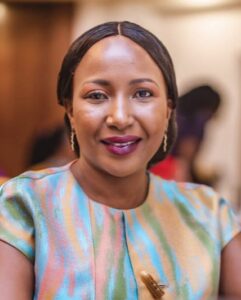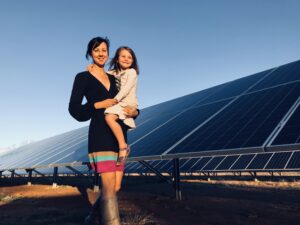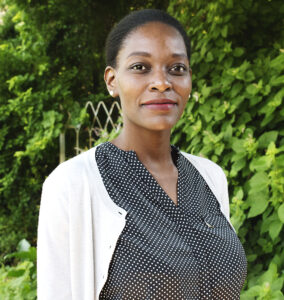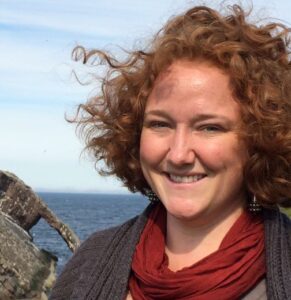Meet the women working for a just rural transition
7 March 2023With women constituting 43 percent of the global agricultural labour force, a just rural transition simply cannot happen without their complete and meaningful inclusion. This International Women’s Day, we are celebrating some of women working to make that transition a reality.
JUDY MATU
Judy Matu is the Founder and National Executive Chair of the Association of Women in Agriculture Kenya (AWAK), a women-led non-profit organization empowering female smallholders to develop climate-smart agribusinesses.

What inspired you to start AWAK?
The inspiration came from my childhood and seeing how hard my mother had to work to secure my education. During the dry season, she would sometimes spend all day looking for fodder for the cattle, and even then, she made just enough money to meet our family’s needs. I remember thinking: how many more families are going through these struggles? I decided [that] more resources should go towards women in agriculture to support and improve their livelihoods.
How does your organization help female smallholders?
At AWAK, we’re building the capacity of women in agriculture to become informed decision makers and key industry players. To do this, we’re providing them with the skills to make better and more sustainable use of their land, adopt climate-smart agriculture, and work with other women to aggregate their produce and improve their market access. Since most women don’t have the financial capacity to do this by themselves, we’re also advocating for policies that support this transition financially.
What climate-smart practices does AWAK promote?
We train women to restore and sustain their agricultural landscapes through agroforestry and conservation agriculture. We’re also training women to convert waste into biomass briquettes, which can be burned instead of wood. Not only does this leave the trees standing, but the residue from the burned briquettes can be buried, improving soil health and sequestering carbon.
What policy changes are needed to better support women in agriculture?
There’s a lot of talk about loss and damage right now. And yet the women I work with – those who are losing the most to climate change – are not even considered during policy development. So we need to see these women at the table when decisions are being made. Decision makers need to understand how hard they’re working to improve agricultural productivity and protect the environment. Once they have that understanding, then I think we will start to see better policies being made.
KARIN STARK
Karin is the Director of Farm Renewables Consulting, an Australian company working to reduce agricultural costs and emissions while increasing resilience by facilitating the uptake of on-farm renewables.

What role does energy have in a just rural transition?
Energy has a massive role to play. On the one hand, farmers are big users of energy. Energy costs can be huge and have only been increasing in recent years. On the other hand, farmers have the potential to be big producers of energy. As the cost of renewables and especially solar continues to fall, they offer a massive opportunity for farmers to not only reduce costs, build resilience, and reduce emissions, but generate energy for the grid or the local community. This puts farmers in a unique and powerful position.
How do you promote on-farm renewables?
Living on a farm, I understand firsthand the impacts climate change is already having on farmers’ profitability and sustainability. But there aren’t many organizations or events providing credible or useful information about on-farm renewables. That’s why I launched the National Renewables in Agriculture Conference in 2019. It’s proved a great platform for farmers to not only learn from technology providers and decision makers, but to come together and share their own experiences. The following year I established Farm Renewables Consulting, which shares knowledge and stories to drive innovation and shape policies and programmes around agriculture and renewables.
How do you address local resistance to renewable energy projects?
We need to look at creating meaningful long-term benefits for the people who are shouldering the impacts of the development and construction of renewables. My work aims to bring everyone in and give the community more of a voice in this transition. What do they want out of this? What’s important to them? We need to go about this in a fairer and more equitable way.
SABRINA MASINJILA
Sabrina Masinjila is the Research and Advocacy Officer at the African Centre for Biodiversity (ACB), an organization promoting agroecology and championing food sovereignty across Africa.

What makes the global food system unjust for African smallholders?
The global food system is focused on the production of a handful of commodity crops. This concentrates power and profits in the hands of a few agribusinesses and marginalizes smallholders in Africa. At the same time, the global food system is a major driver of climate change, biodiversity loss and freshwater extraction – crises which are hitting smallholders the hardest.
How do you support and protect farmer seed systems?
Farmer seed systems give smallholders to freedom to choose the seeds that are ecologically best suited to their land – to its soil, climate, water and so on. This makes farmer seed systems a vital tool in agroecology. At ACB, we’re trying to secure legal recognition for these seed systems and their role in preserving biodiversity. We’ve also written critiques of current seed laws in Africa, which focus on formal, certified seed systems, and have raised awareness of these laws among smallholders.
How do you ensure smallholders have a greater say in decision-making?
To increase farmer awareness of, and engagement in, the decision-making process, we monitor policy processes and outcomes at the national, regional and global level, and disseminate our findings through farmer networks. In addition, we take part in some of these processes to ensure farmer voices are present. In South Africa, where ACB is based, we’ve also helped farmers attend decision-making processes by covering their travel costs.
DR. BRONWEN POWELL
Bronwen is an associate professor of Geography, African Studies, and Anthropology at Pennsylvania State University. Her research explores the social, cultural, and environmental drivers of nutrition, diet, and food security.

How does your research relate to a just rural transition?
I started my research trying to help rural communities in Africa enjoy healthy diets. This idea still persists that the low-income rural mother doesn’t know what to feed her family. But that’s simply not the case. Having spent lots of time talking to rural women in Tanzania, Ethiopia, Burkina Faso, and Morocco, I’ve yet to meet a mother who doesn’t know that fruits and vegetables are healthy.
So, we have to resist the urge to think we can somehow fix rural diets solely through education. Instead, we need to look at the structural constraints on healthy diets – things like agricultural policies and landscape change. Because these are the factors that rural communities often don’t have an equal say in.
Why does biodiversity matter for food and nutrition security?
If we’re going to provide the global population with a healthy diet, we have to move away from the current goal of planting huge monocultures of maize, wheat, and rice. And to do that, we need biodiverse agricultural landscapes and biodiversity-friendly farming practices. For example, some of my research has shown that more than 50 percent of the fruit consumed globally is produced on trees. So, if we want to increase fruit production, we need to embrace disciplines like agroforestry and agroecology that look at farming and conservation together.
Why is science communication important to you?
I’m a very policy-focused researcher. The reason I do science is to try and make the world a better place. And if you want to have conversations with policymakers, you have to learn to communicate your work in a way that everybody can understand. It takes time and effort, but it’s worth it.
